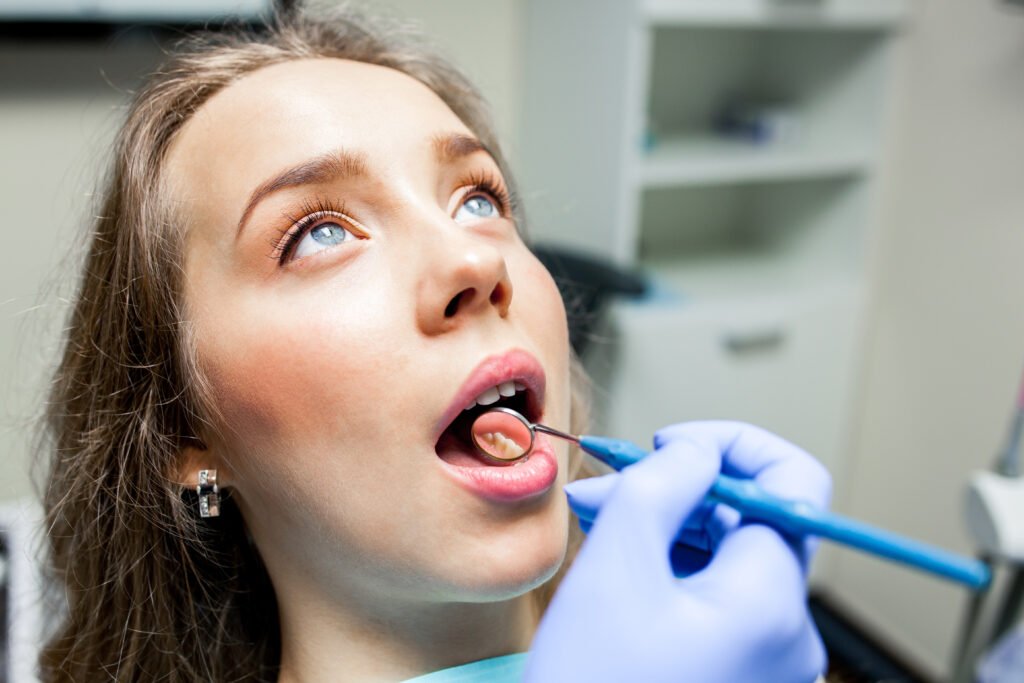Saturday - Wednesday: 9 AM - 10 PM
Thursday: 9 AM - 9 PM
Friday: Closed

August 19, 2025
What Is Tooth Decay? Causes, Symptoms, and Prevention
Tooth decay is something most of us have heard about but few truly understand until it starts causing pain or visible damage. It begins silently, fueled by everyday habits like frequent snacking, sugary drinks, or skipping nightly brushing.
At Diamond Dental Clinic in Kuwait, we believe dental care should be more than just fixing cavities. It should be about empowering patients with the right knowledge and preventive strategies. In this blog, you will discover what tooth decay really is, its causes, warning signs, natural ways to protect your teeth, and how our specialized Dental Caries treatment in Kuwait helps restore and maintain a healthier smile.
Whether you are worried about your own teeth or your child’s, this guide is here to help you make informed choices and keep your smile strong for life. So, let’s start by understanding what exactly tooth decay means and how it affects your teeth over time.
What Is Meant By Tooth Decay?
Tooth decay, often called dental caries or cavities, is a gradual process where the hard outer layer of your teeth (enamel) breaks down due to acids produced by bacteria. These bacteria thrive on sugars and starches from the foods and drinks we consume, forming plaque, a sticky film that clings to teeth. Over time, the acids in plaque weaken the enamel, leading to small holes or cavities that can grow deeper if left untreated.
Tooth decay isn’t just a surface problem. It can affect deeper layers of the tooth, eventually causing pain, infection, or even tooth loss. It is one of the most common dental issues worldwide, yet largely preventable. By understanding what tooth decay is and how it starts, you can take simple daily steps, like maintaining good oral hygiene and regular dental check-ups to protect your smile and overall oral health.
What Are The Causes Of Tooth Decay?
After understanding what tooth decay is, it is equally important to explore the main causes of tooth decay and why it happens in the first place. Tooth decay isn’t random, it is closely linked to everyday habits, diet, and even natural factors like saliva and genetics. By knowing these causes of tooth decay, you can better identify what might be putting your teeth at risk and take steps for how to prevent tooth decay naturally and avoid future problems.
- Plaque build-up and bacteria
Plaque is a sticky, colorless film made up of bacteria that constantly forms on your teeth. When plaque isn’t removed by daily brushing and flossing, it hardens and creates the perfect environment for bacteria to thrive. These bacteria feed on food particles and sugars, producing acids that gradually erode your tooth enamel and start the decay process which can eventually lead to tooth decay symptoms like sensitivity and visible cavities.
- Sugary and acidic foods & drinks
Frequent consumption of sugary snacks, soft drinks, fruit juices, and even starchy foods like bread and chips fuels the bacteria in plaque. These bacteria turn sugars into acid, which softens and weakens the enamel. Acidic foods and drinks, like citrus fruits, soda, and vinegar-based products can also directly wear down enamel, increasing the risk of cavities and speeding up early signs of tooth decay.
- Poor oral hygiene habits
Inconsistent brushing, skipping flossing, or not using fluoride toothpaste makes it easier for plaque and bacteria to build up. Over time, this speeds up the acid attacks on enamel, leading to tooth decay that could often be prevented with simple daily habits and even some home remedies for tooth decay, like rinsing with water after meals.
- Dry mouth / reduced saliva
Saliva is not just moisture, it is a natural defense against decay. It helps wash away food particles, neutralizes acids, and provides minerals that strengthen enamel. Conditions like dry mouth (often caused by certain medications, stress, or medical issues) reduce saliva flow, making teeth more vulnerable to decay.
- Other risk factors (age, genetics, certain medical conditions)
Some people may naturally have deeper grooves in their teeth, thinner enamel, or a family history of dental problems, increasing their risk. Age can also play a role: children and older adults often face higher risk due to diet, medications, or reduced dexterity when cleaning teeth. Medical conditions like diabetes, acid reflux, or eating disorders can further contribute to decay.
How Does Tooth Decay Occur?
Tooth decay is not an instant problem, it is a gradual process driven by everyday habits and what we eat. Understanding each stage of tooth decay helps you see why prevention matters and how small choices can protect your teeth. Here’s how it happens in detail:
- Plaque forms on your teeth
Throughout the day, a thin, sticky film called dental plaque builds up on your teeth. Plaque contains millions of bacteria that naturally live in the mouth. When not removed by brushing and flossing, plaque hardens and clings stubbornly to teeth, especially around the gumline and in hard-to-reach areas.
- Bacteria feed on sugars and produce acid
Whenever you eat or drink foods rich in sugars or starches, like sweets, soft drinks, bread, or even fruit, the bacteria in plaque break these down and produce acids as a byproduct. These acids remain on the tooth surface for some time after eating, leading to acid erosion on teeth.
- Acid attacks the enamel
The enamel is the hard, mineral-rich outer layer of your teeth, and these acids slowly erode its surface. Over time, repeated acid attacks cause minerals (like calcium and phosphate) to leach out of the enamel, weakening it.
- Early decay begins
At this stage, you might not see visible holes yet, but white spots may appear where the enamel has started losing minerals. This is the earliest sign of tooth decay and is still reversible with proper oral care and fluoride.
- Cavities develop and spread deeper
If acid attacks continue and oral hygiene isn’t improved, the enamel breaks down completely, leading to small holes called cavities. Decay then spreads into the softer dentin beneath the enamel, which makes teeth more sensitive and speeds up damage. Eventually, if untreated, decay can reach the pulp (the innermost layer with nerves and blood vessels), leading to toothache, infection, or abscess.
Signs of Tooth Decay: Common Symptoms and Early Warning Signs
Now that you know how tooth decay develops step by step, the next important thing is learning how to recognize it in real life. Spotting the early signs of tooth decay can help you take action before the damage becomes severe, and can often save you from pain and costly treatments. Here’s what to watch for at different stages of tooth decay:
- Early signs: white spots and mild sensitivity
In the beginning, tooth decay symptoms might not cause obvious pain. Instead, you may notice faint white spots on the tooth surface, areas where minerals have started to wear away. Some people also feel mild sensitivity when eating or drinking something hot, cold, or sweet. At this stage, decay can often be reversed with improved oral care and fluoride treatment.
- Progressive signs: visible holes, pain, and discoloration
As decay advances, the enamel breaks down further, leading to small cavities or holes. Teeth may start showing brown or black spots, and you might feel discomfort while chewing, biting, or consuming hot or cold food and drinks. Teeth can also appear dull or show signs of tooth discoloration, which can signal deeper enamel damage.
- Severe signs: toothache, infection, and bad breath
When decay reaches deeper layers of the tooth, it can cause a persistent toothache or sharp, throbbing pain. You might notice swelling or pus near the affected tooth, along with bad breath or an unpleasant taste in your mouth. At this stage, prompt tooth decay treatment is essential to prevent serious complications or tooth loss.
How to Prevent Tooth Decay Naturally?
Tooth decay is common, but the good news is, it’s largely preventable. By making a few mindful changes to your daily routine and diet, you can protect your teeth naturally. Here are some practical, natural ways to help keep decay at bay:
- Brush and floss daily with good technique
Consistent, thorough brushing (at least twice a day) and daily flossing remove plaque and leftover food particles that bacteria feed on. Using fluoride toothpaste helps strengthen enamel naturally by replenishing lost minerals and acts as a key step in tooth decay prevention.
- Limit sugary and acidic foods and drinks
Frequent snacking on sweets, sodas, or starchy foods increases acid production in the mouth. To help prevent tooth decay, choose fresh fruits, crunchy vegetables, and water over sugary snacks, and rinse your mouth after meals if brushing isn’t possible.
- Eat tooth-friendly foods
Foods rich in calcium and phosphorus, like cheese, yogurt, nuts, and leafy greens help strengthen enamel. Crunchy fruits and vegetables (like apples and carrots) naturally clean teeth by stimulating saliva flow.
- Stay hydrated
Drinking plenty of water helps wash away food particles and keeps saliva levels high. Saliva is your mouth’s natural defense against acids because it neutralizes them and helps repair early enamel damage.
- Use natural oils and rinses (as complementary care)
Some people use coconut oil pulling or green tea rinses for their mild antibacterial properties. While these shouldn’t replace brushing and flossing, they may help reduce harmful bacteria when used carefully.
- Maintain regular dental check-ups
Even if you focus on natural prevention, professional cleanings and early check-ups are essential to catch small problems before they become bigger issues.
By combining daily oral hygiene, balanced nutrition, and mindful habits, you can protect your teeth naturally and keep your smile healthier for years to come.
Tooth Decay Treatment at Diamond Dental Clinic in Kuwait
When tooth decay progresses beyond the early stages, professional treatment becomes essential to stop further damage and save your natural teeth. At Diamond Dental Clinic in Kuwait, we understand how important it is to restore your dental health with care that combines advanced technology and a gentle approach.
Our specialized Dental Caries treatment in Kuwait is designed to address cavities at every stage. Whether it’s a small filling for early decay, a dental crown to protect a weakened tooth, or root canal therapy for more severe cases, our experienced team ensures each treatment is tailored to your needs. We also focus on preventive care, helping patients maintain strong, healthy teeth long after treatment is complete.
As a renowned dental clinic in Kuwait, Diamond Dental is dedicated to delivering comprehensive care in a comfortable environment. From diagnosis and digital imaging to precision treatment and aftercare, we make sure every patient feels confident and supported on their journey to a healthier smile.
If you are experiencing toothache, sensitivity, or suspect you may have dental caries, don’t wait. Visit Diamond Dental Clinic in Kuwait for expert evaluation and personalized treatment that protects your teeth and keeps your smile strong.
Conclusion
Protecting your teeth from decay is about investing in your overall health and quality of life. By understanding what tooth decay is, the daily habits and foods that contribute to it, and the warning signs to watch for, you can make more informed choices every day. Prevention starts with simple steps: brushing and flossing properly, eating a balanced diet low in sugars, and staying hydrated to support your mouth’s natural defenses.
Yet, even with the best care, decay can sometimes develop. That is why having the right dental support matters. At Diamond Dental Clinic in Kuwait, we don’t just treat dental caries; we help you understand your unique risk factors and create a personalized plan to keep your teeth strong for years to come. Our expert team combines advanced technology with a gentle, patient-centered approach, so you feel comfortable and confident every step of the way.
Remember: tooth decay caught early is far easier to treat and less likely to cause pain or lasting damage. Prioritize regular dental check-ups and professional guidance, and you’ll keep your smile healthier and brighter for life. If you suspect you might have a cavity or simply want to protect your teeth better, visit Diamond Dental Clinic in Kuwait for trusted care tailored to you.
FAQs
- How to stop tooth decay from spreading?
A: Brush and floss thoroughly every day, reduce sugary foods and drinks, and see your dentist promptly. Early professional treatment like fillings or fluoride applications can help prevent further damage. - Can tooth decay be reversed?
A: In its earliest stage, when it appears as white spots, decay can sometimes be reversed through fluoride treatments, improved oral hygiene, and a balanced diet that supports enamel remineralization. - How to repair tooth decay?
A: Small cavities are typically treated with dental fillings. More advanced decay may require crowns or root canal treatment to restore the tooth’s structure and function. - How to prevent tooth decay in kids?
A: Help children brush twice daily with fluoride toothpaste, limit sugary snacks and drinks, and schedule regular dental check-ups. Dental sealants are also effective in protecting their teeth from cavities. - What foods help protect against tooth decay?
A: Foods rich in calcium and phosphates, like cheese, yogurt, and leafy greens, help strengthen enamel. Crunchy fruits and vegetables stimulate saliva, which naturally protects teeth. - Does drinking water help prevent tooth decay?
A: Yes. Drinking water, especially fluoridated water, helps wash away food particles, neutralize acids, and keep saliva levels high, all of which protect teeth from decay. - Is tooth decay painful right away?
A: Often, early tooth decay doesn’t cause pain. Discomfort or toothache usually appears when decay has progressed into deeper layers of the tooth. - Are dental sealants only for children?
A: While sealants are most commonly used for children and teens, adults without decay or fillings in their molars can also benefit from sealants to help prevent cavities. - How often should I see a dentist to prevent decay?
A: Most people should visit their dentist every six months for a check-up and cleaning. Those at higher risk of cavities may benefit from more frequent visits as advised by their dentist. - Can tooth decay affect overall health?
A: Yes. Untreated tooth decay can lead to infections that may spread to other parts of the body, and chronic dental problems have been linked to conditions like heart disease and diabetes. Regular dental care helps protect both oral and overall health.
Search
Recent Posts
-
Top 10 Benefits of Dental Implants
19, Aug, 2025
-
What Is Tooth Decay? Causes, Symptoms, and Prevention
19, Aug, 2025
Looking for professionals & trusted medical healthcare?
Don't hesitate to contact us.

Contact Us
Get In Touch With Us
© 2024 All Right Reserved














